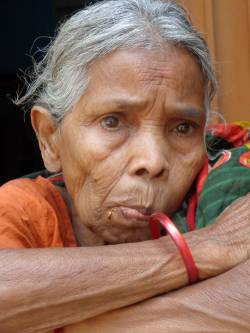 Today, International Widows’ Day is observed to address the poverty and injustice faced by widows and their children around the world.
Today, International Widows’ Day is observed to address the poverty and injustice faced by widows and their children around the world.
When I think of the hardships that widows, in particular older widows face, I am instantly reminded of a conference I attended on ageing and women in Kolkata, India in last April. Ms Aarati Saxena of Delhi University raised an interesting point about older women living in Vrindavan and Varanasi, renowned sacred places in India.
Women mostly from West Bengal were once sent to such places when widowed. Now it seems unacceptable for a woman to have to give up everything because they’ve lost their husband. Ms Aarati asked me if this was the same in Bangladesh since once both Bengals shared common culture before partition of Indian sub-continent. Suddenly this question struck me and I started to think about older widows in my home country.
One in four women widowed or divorced by age 50
It had never occurred to me that a female member of my family could be abandoned just because she is older or a widow. That does not mean though that older widowed women in Bangladesh do not face difficulties. The Asian Development Bank estimates that one in four women in Bangladesh will be widowed or divorced by the age of 50.
The 2001 census data shows that 91% of older women were widowed or separated compared with only 9% of older man. As well as dealing with widowhood, many older widows face poverty, poor health and abuse.
Generally, widowed women are more dependent on family and face worse socio-economic conditions than men. Fewer than 1 million women receive widow allowance of 300 taka (US$4) per month.
Because of the sometimes temporary nature of their living arrangements they are missed by the development agencies as well.
A little help can change older women’s lives
HelpAge’s work proves that a little help can change the lives of older women. Sabita (pictured above) is 62 and a widow from the coastal village of Cox’s Bazar. She is a member of the village older people’s association. She received 6,000 taka (US$77) as a loan from the association. She used the money to give to her son, who is a carpenter, so he could buy tools.
Now the son’s business is doing well and he was able to help Sabita recover her land, which she had had to rent. Sabita now grows vegetable on the land and has gained respect as an active member of her extended family.
Poor healthcare hampers older women as they age
Poor healthcare services are still one of the most significant problems for older people in developing countries. The number of hospital beds per 10,000 people is only 4 in Bangladesh. The doctor to patient ratio is 1 to 4,719.
The general government expenditure on healthcare was only 7.9% of total government spending and people have to pay for their healthcare bills out of their own pockets.
Consequences of poor reproductive healthcare hamper older women during old age as well. Of every 10,000 married women, about 17 suffer from fistulas; an abnormal connection between the lower portion of the large intestine and the vagina. This often occurs from an injury during childbirth and can cause serious infections.
A significant number of women living with fistulas in Bangladesh are not aware of the treatment available or needed. Many sufferers live alone, ostracised by husbands, family and community.
With our Affiliate, the Bangladesh Women’s Health Coalition (BWHC), we provide health support services to older women and widows. A voucher worth 300 taka (US$4) per month and homecare from health workers can change lives and enable women to look after their grandchildren.
Older women suffer abuse and neglect
An unpublished study from HelpAge with Dhaka University shows that 54% of older people living in urban slums are suffering from abuse and neglect within their households, more than half are older women.
 Mahamaya is 65 and lives with her son’s family. She used to do all household chores and was often scolded by her family, including her own son and granddaughter for not contributing financially to the household.
Mahamaya is 65 and lives with her son’s family. She used to do all household chores and was often scolded by her family, including her own son and granddaughter for not contributing financially to the household.
She has since become a member of an older people’s association, which helped her resolve the conflict with her family. She can now live a dignified life.
That day I replied to Ms Aarati that, despite all this suffering, in most cases older women and widows in Bangladesh live in families. Thankfully, abandoning older women when they are widowed is not an option. This is a small consolation to the older women in Bangladesh who face so many hardships throughout their lives. My thoughts are with them today, International Widows’ Day.
